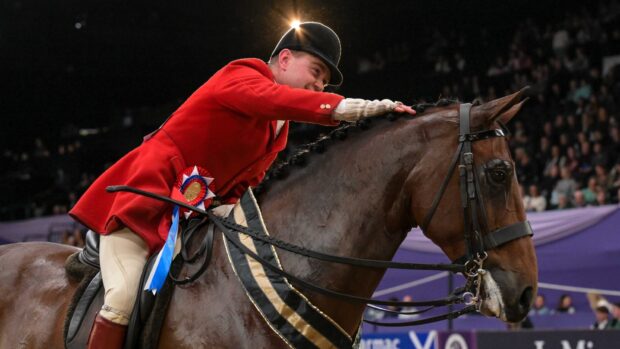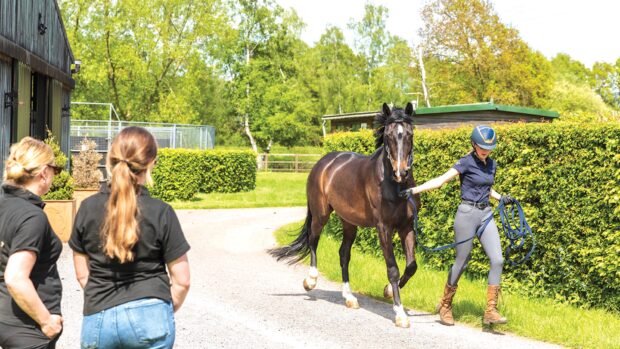If you’re on the hunt for a top-class show horse for this season and beyond, then these tips on how to buy a show hunter could be a good place to start.
What is a show hunter?
Sport Horse Breeding of Great Britain’s definition of a show hunter is “a mare or gelding capable or likely to be capable of carrying its designated weight regularly for a full day’s hunting. It should have substance, quality and a calm, bold temperament. It should have the conformation to produce high performance.”
The British Show Horse Association adds: “It should have the conformation to produce high performance with sustained soundness. It should be alert and when ridden, have four athletic natural paces.”
Show hunters are divided into three weight sections; lightweight, middleweight and heavyweight.
A lightweight should be able to carry up to 12st 7lb, stand around 16-16.2hh and have about eight and a half inches of bone under the knee.
A middleweight hunter stands around 16.3hh, can carry between 12st 7lb and 14st and has around nine inches of bone.
A heavyweight stands around 17hh, has nine to nine and a half inches of bone and is capable of carrying more than 14st.
In addition to the three weight divisions, hunters can contest small hunter classes (horses under 15.2hh), ladies’ hunter classes (to be ridden side-saddle) and working hunter classes, which includes a jumping section.
Show hunters are arguably one of the most competitive classes within showing. The main championships are held at the Royal International (RIHS) and the Horse of the Year Show (HOYS), with separate classes for amateur hunter owners at some shows.
A show hunter is a solid choice for an amateur due to their versatility and ability to compete in multiple disciplines.
What should I look for in a show hunter?
Robert Walker is the circuit’s leading producer of hunters. He has won the Horse of the Year Show (HOYS) hunter championship numerous times, including in 2023 riding MHS Morning Master. He is known for producing young hunters through the ranks.
“Conformationally, he has got to be sound with no faults,” begins Robert, who has also won the prestigious novice hunter accolade at Royal Windsor several times during his career. “I would never buy a horse that is back at the knee or that has a bad foreleg. It’s a big no no for me and I would always walk away from something with this fault.
“Ultimately, the horse needs to have a category to fit into, too. When I’m looking at him I’m asking myself ‘what would he make and where will he end up?’ Will he make a lightweight, middleweight, a heavyweight, or a small? Can I predict his type in some way by looking at his current frame and at the breeding?”
Robert says that ensuring your potential buy has the X-Factor is essential.
“One of the main things we’re also looking for is star appeal. He’s going to be a show horse so this element is vital,” he confirms. “Due to breeding influences over the years the movement of each of the weights has become more similar. There are some heavyweights out on the circuit that have such good steps. Hunter classes are now so competitive that a horse has to move across the floor and go around the ring elegantly, like dancers on a dance floor. Movement sets the best apart from the rest.”
If looking at an older horse with some mileage under its belt, Robert says: “Try to find something that still enjoys the game. It can be hard to find one that has done a few seasons but is still up for the job. Try to assess if the horse will stand up to different types of going, too. We often get sent older horses for hunting as they didn’t like the harder ground you often need to perform on during the summer season. With this in mind, also pay close attention to his joints and joint capsules. Ask yourself if this horse is going to have much longevity.”
What weight or age of hunter should I buy?
It is important to be suitably mounted with a horse of the correct size and stamp for your height and weight. Robert also says that you need to consider your own situation before choosing a stamp or age of horse.
“People have different circumstances,” explains Robert. “If you work full time and have an elderly parent putting your horse in and out, you need something that they are going to be able to cope with. Most young hunters are impressive, strapping animals, so ask yourself if the horse in question will fit in with your lifestyle. Size is irrelevant, really, as it’s more about the temperament and level-headedness of the horse.”
Where shall I buy a hunter from?
Hunters for sale will be advertised at various times in the season on online platforms, as well as being sold via word of mouth.
“When I was a teenager buying a hunter was a much easier process,” says Robert. “Nearly every agricultural show or major fixture like Royal Dublin had an abundance of traditionally-bred young horses that were for sale. Today, there are usually one or two on the market that everyone wants.
“My main advice for buyers is to be open-minded. I’m very fortunate that I have lots of young horses coming through and we have the space to turn them away if necessary. This isn’t practical for everyone and some riders can only have one horse. In this case, don’t be afraid to ask the professionals if they know of a horse for sale.
“At the end of the season we have a few young horses that have had a good education up for sale. It’s not because they aren’t good enough, but we need to make space for the next crop coming through. Ask around and you might be surprised at what you might find.”
How much should I expect to pay for a hunter?
“Everything has gone up in price, including the price of horses,” says Robert. “You might be very lucky and drop onto one that someone wants rid of due to circumstances. But, nearly everyone knows if they’ve got a really good horse. The top horses will always fetch the top money.
“Generally, you can expect to pay anywhere between £25,000 and £40,000 for a top established horse being shown at the highest level. While £10,000 and £15,000 could get you a nice young horse. But they’re all priced differently and if you want a good horse you will need to pay the money; you could buy an old banger, or you could get what you want, but you’ll need to pay!”
What happens when I’ve agreed to buy a horse?
When you have agreed on a sale, it is time to organise a pre-purchase vetting, something that is strongly recommended.
The vet will assess the horse with the specific job you want it for in mind, so it’s important to let the vet know prior to the vetting that your main goal is to compete as a show hunter. If you tell the vet that you want the horse for the show ring, they should hopefully inform you of any blemishes or conformational faults which could impact its future career, even if they don’t impact its soundness or performance.
Robert says: “I appreciate that I have the experience to check a horse over myself, but if you don’t have this knowledge then get a vet involved. I would look around the horse, check how it lands when being trotted up and I would listen to the breathing. If you don’t have this experience then ask around and find a vet you can trust to do the assessment.”
For more information, you can read H&H’s ultimate guide to buying a horse.
- To stay up to date with all the breaking news from major shows throughout the season, subscribe to the Horse & Hound website
You may also be interested in:

How can I buy the perfect working hunter?

Looking to buy a show hunter pony? Where to search and exactly what to look for

How to buy the perfect Dartmoor pony for either yourself or a child

How can I buy my perfect Connemara pony?

Looking for your child’s next working hunter pony? Our guide is packed with useful advice

Subscribe to Horse & Hound magazine today – and enjoy unlimited website access all year round




